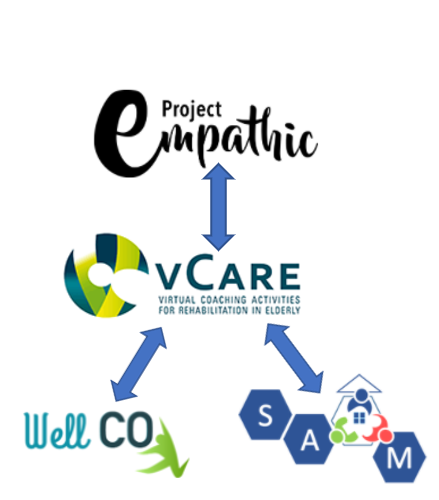Learning from a cluster of other projects implementing the Virtual Coach
All the projects funded under the same European Commission funding call as vCare had Virtual Coaches as their central focus – the PM-15 initiative). They all established communication channels which enabled targeted communication between the projects and shared participation in major project-related events.
In 2020, vCare decided to launch a complementary initiative. The idea was to set up a series of brief online workshops. All the relevant projects were to be brought together to learn lessons, share mutual experiences, and increase capacity. The ultimate purpose of the workshops was to allot sufficient time to exchange experience on a number of questions considered as critical by projects.
A series of three workshops

Three projects answered positively to vCare’s proposal to organise dedicated bilateral workshops. They were: Empathic, Saam and Wellco. These three projects were in their closing cycle of work, and were thus in a position to bring their consolidated feed-back and learnings to the workshops.
The three workshops took place during in October and November 2020. In each workshop, both projects were asked to give evidence of, and their opinions on, the following questions
Three topics of conversation were selected by all projects, and the workshop agenda planned with them ahead of time:
- Participatory design: How have both projects implemented participatory design in the different phases of the project (including evaluation)? Which tools and methodologies have been used? How were the end users selected and for what?
- Key services: What are the key services that both projects implement ? What has been needed to develop/ implement them?
- Innovation and exploitation: What are the main TRULY innovative aspects in both projects? How do we each envision the exploitation/follow-up of the project?
Two further topics were discussed with some of the three projects. They were related to standards adoption and implementation and the impact of the Covid-19 pandemic on the project cycle and working approach.
The vCare consortium was eager to learn from other almost-finished projects what their main lessons learned had been, and how vCare could adopt suitable good practices as a result of their experiences.
Lessons learned
All four projects have elaborated approaches to support participatory design and to gather users’ feedback. In planning their work, the challenges of the Covid-19 pandemic came to the fore.
Most of the other projects had focused on people who are not specifically patients. While the clinical focus on patients is quite vCare specific, there is clearly a possibility to generate a generalised methodical approach to user involvement. All the projects had faced significant problems with organising user/patient tests, as a result of the pandemic, and had had to develop coping strategies to deal with it. The three ‘sister projects’ are currently all in their final testing phase, and the information they collect will be very useful for vCare – which still has quite a long testing period ahead of it.
Empathic
vCare was happy to learn how Empathic had designed detailed specific requirements to collect users’ feed-back: in particular, the design of the avatar, e.g., what aspects of the avatar are better accepted by seniors, opinions about the way the avatar moves, features that the users liked the most. Empathic has also some very interesting results related to multimodal analysis of emotions (i.e., emotion from speech, text, face, and gaze) in order to create a professional Coach that is fully based on dialogue with the user.
Learnings for the vCare Living Lab phase: This sort of user feedback on the avatar should be deepened in the vCare Living Lab Phase of the project, once patients use the first vCare prototype. This approach should help to obtain a human-driven prototype. The aspect of emotional analysis is foreseen in vCare but it is not a key aspect.
SAAM
The SAAM project had considered it essential to create specific personas and use cases to represent healthy users. The approach was structured into four steps: (i) needs assessment through a quantitative survey, (ii) creation of a generic user profile, (iii) qualitative inquiry to understand deeper the needs of seniors, (iv) creation of user stories translated into bigger use cases. In the SAAM project, there is no visual representation of the coach. Interactions between users and technology is kept to a minimum, thanks to the use of ambient sensing, signalling, and machine learning algorithms.
Learnings in terms of evaluation and improving services: The vCare workshop participants appreciated two aspects of the SAAM approach. They valued the evaluation approach of the SAAM first prototype, and the way in which it was structured according to two research perspectives: acceptance and user experience; and Coaching and well-being. They acknowledged the project’s willingness to avoid any digital divide, and which would deprive any portion of the population from accessing the service.
WellCo
WellCo’s focus is on improving the well-being of healthy seniors. Like vCare, WELLCO provides personalised recommendations through sensors and data in order to motivate the user to change their behaviour in a healthier direction. Machine learning algorithms are used to analyse the emotions of the user in order to perform the user assessment. This assessment is used to provide targeted recommendations to users in the areas where they need to improve, and to check the progress of the user with respect to the baseline status. Based on the specific, personalised recommendations, WELLCO provides users with immediate rewards. The rewards are given to the patients while they are improving, and constantly monitors the improvements. WELLCO’s motivation model includes incentives to increase the user’s level of social interaction with other users (through social networks). In the social network, users can exchange comments, experiences, and receive notifications when other users achieve certain goals. Finally, WELLCO encourages human interaction through the possible involvement of experts in deciding on the recommendation(s) that suits the users most.
Learnings on motivation: The vCare participants were also very much inspired by WELLCO motivational model. The adoption of similar motivation models and incentives and the integration of supplementary services (such as the use of social networks) could be considered in a follow-up project.
Next steps
Now that closer contacts among all four projects have been established, vCare will follow with increased interest the projects’ results. In particular, vCare wants to follow up on their answers to common issues such as the acceptance, robustness, and feasibility of Artificial Intelligence/Machine Learning. There are three aspects that vCare is especially interested to better integrate in the future evolution of its own service. These are an emotions-sensitive avatar, the universal accessibility of services, and motivational approaches to healthier behaviours.
